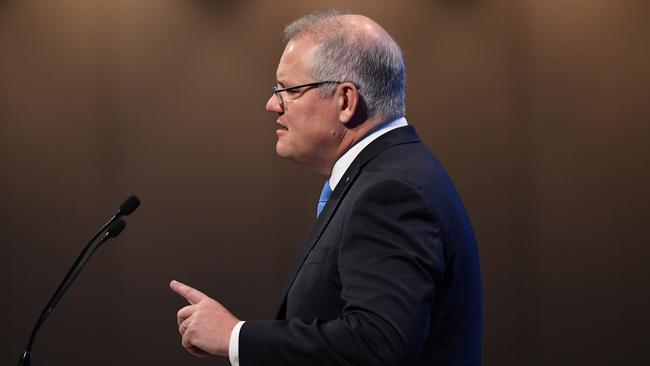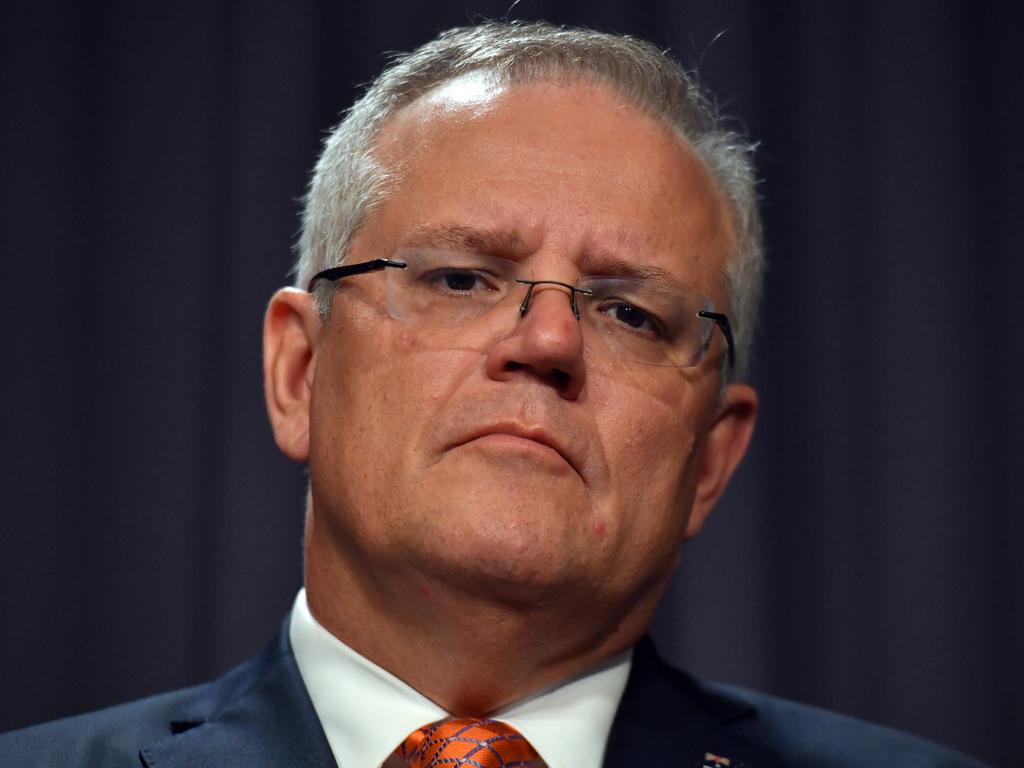Scott Morrison warns fallout from coronavirus may be worse than GFC
PM vows his stimulus package won’t cause long term debt for future governments as he warns coronavirus may be worse than GFC.
Scott Morrison has vowed his upcoming stimulus package will not cause long term financial debt for future governments as he warned the economic fallout from the coronavirus could be worse for Australia than the GFC.
Speaking at a business summit in Sydney on Tuesday morning, the Prime Minister called on business leaders to act patriotically as the country faced a “Team Australia moment”.
Ahead of the expected release of the government’s stimulus plan, Mr Morrison noted it required different behaviour from the response to the GFC because the country was facing “a biological contagion, not a financial one”, and because Australia is more geographically and economically reliant on China than it was to America after the GFC.
“The epicentre of this crisis as opposed to that one is much closer to home,” he said.
“The GFC impacts were centred on the North Atlantic, and back then China was in a position to cushion the blow for Australia.”
Mr Morrison also outlined seven points that will guide the government’s stimulus response, which include taking into consideration the policies and current situations of each state government.
“First of those is that measures must be proportionate to the degree of economic shock and the impact on the economy.
“Secondly, they need to be timely and scalable, so they can be adjusted appropriately as the health and economic effects evolve.

“Third, the response needs to be targeted to address the specific issues we are confronting, supporting those most affected, and delivered where it will be most effective. We must not waste taxpayers’ resources.
“Fourth, the response needs to be aligned with the many other arms of policy and activity, in particular monetary policy, and with the responses of other governments, particularly at a state and territory level.
“Fifth, we must use existing delivery mechanisms wherever possible. That’s where it goes pear-shaped, if you get that design wrong, as we learned from the last stimulus. We saw those mistakes of trying to rush a range of new programs in response to the GFC.
“Sixth, the measures must be temporary and accompanied by a fiscal exit strategy. We cannot bake into the bottom line this response for years to come, holding the budget under water.
“Finally we must favour measures that will lift productivity to enable the Australian economy to sustain an even stronger growth trajectory than we were on prior to the crisis.
“We will prevent the need for future governments to spend the better part of a decade restoring the fiscal position, and even longer paying back the debt.”
Appealing to business leaders, Mr Morrison said Australia faced a “Team Australia moment”.
“If you’re a large business, go back to your office today, pay your supplier invoices, and commit to pay them even faster for the next six months.
“That is what sticking together looks like. How you support your customers, your suppliers, your employees during the next six months and potentially beyond will say more about your company, your corporate values, and the integrity of your brand than anything else you’ve likely done as an organisation.
“We also need your investment, looking ahead to the opportunities that are on the other side. Take the opportunity to invest in the skills of your workforce, or in the capital projects that will provide the pathway to a new season of growth that will be there.
“This is a Team Australia moment.”
Commenting on the recent downturn in financial markets, saying: “Now, as they do in times like these – and we’ve seen this obviously in the last 24 hours in particular – financial markets have sought to move to respond and seek to reprise the risk that they’re seeing.”
“This is giving rise to particularly sharp movements in global equity and financial markets. Off record highs, sure, but the impact on investors and retirees and no doubt the Sovereign Wealth Fund.
“Uncertainty has led to volatility in financial markets. However, Australia’s financial markets continue to operate effectively.
“There is the potential for heightened risk aversion to flow over into reduced business and consumer spending, reduced demand across our economy. These effects would be greater if coronavirus were to have a significant impact on the health of our workforce, which is what we need to plan for, and that’s something we’re working very hard to prevent at the moment.”
Mr Morrison urged Australians to “get some perspective” and remain “level-headed” after panic selling rocked global markets overnight amid the accelerating threat of coronavirus.
“It has nowhere near the mortality rates that we’ve seen from SARS and MERS.
“It’s still a very serious virus but it is moving more towards a very bad flu than it is to a dead type of virus.”
Mr Morrison also refused to comment on the possibility of a recession due to coronavirus, after the ASX and Wall Street’s worst day of trading since the 2008 global financial crisis.
“I don’t find speculation on those things terribly helpful.”







To join the conversation, please log in. Don't have an account? Register
Join the conversation, you are commenting as Logout